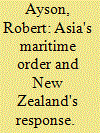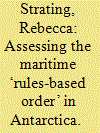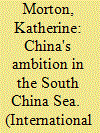| Srl | Item |
| 1 |
ID:
134019


|
|
|
|
|
| Publication |
2014.
|
| Summary/Abstract |
Robert Ayson comments on the South China Sea. Asia's regional security and New Zealand foreign policy
as the powers jostle in a more competitive Asia-Pacific region, it may seem counter-intuitive to call for a clearer New Zealand position on the South China Sea disputes. But even as regional tensions grow, Wellington can stick up for its principles without joining a chorus of China criticism. Under the key government, New Zealand's alignment with the United States is becoming more pronounced through a series of small but cumulatively important steps. this makes it even more important for New Zealand's policy to be staked out clearly, including in written from accessible to the public discussion.
|
|
|
|
|
|
|
|
|
|
|
|
|
|
|
|
| 2 |
ID:
185846


|
|
|
|
|
| Summary/Abstract |
International Relations has become increasingly interested in maritime order as the oceans have emerged as a key site of strategic competition. The South China Sea has become totemic of contests between ‘free’ and ‘closed’ visions of the seas, and is viewed by some as a litmus test for China’s efforts to re-write the ‘rules-based order’ in other maritime domains. This article examines the maritime ‘rules-based order’ in Antarctica, critically examining how and why the United Nations Convention on the Law of the Sea (UNCLOS) matters for the Antarctic region, the Southern Ocean and mechanisms of regional governance. This article contributes to understanding the complexity of maritime order in Antarctica by using Australia’s maritime claims as a case study. Australia is the largest claimant state in Antarctica, with the Australian Antarctic Territory (AAT) constituting 42% of the landmass. This paper examines Australia’s contentious maritime jurisdiction and its ‘normative hedging’ strategy that simultaneously asserts maritime claims and defends collective governance mechanisms, despite the apparent dissonance between these two positions. It argues that the Antarctic region has its own unique ‘rules-based order’ and geographic realities that complicate cross-regional comparisons, and that even so-called ‘like-minded’ states interpret maritime rules in different ways.
|
|
|
|
|
|
|
|
|
|
|
|
|
|
|
|
| 3 |
ID:
146500


|
|
|
|
|
| Contents |
China's expanding presence in the South China Sea is now a major source of escalating tensions leading to a spiral of confrontation with the United States and the littoral states of east Asia. Under these conditions, conventional analysis suggests that serious conflict is almost inevitable. This article provides an alternative perspective by situating China's growing ambition within the broader transformation of maritime order in the contemporary era. On the basis of a new interpretation of maritime order, the study provides a deeper examination of China's motivations in relation to the maritime disputes, US–China strategic competition, and Xi Jinping's new strategy to achieve the great rejuvenation of the Chinese nation. The analysis of the legal, strategic and political dimensions of China's positioning in the South China Sea suggests that maritime nationalism rather than the quest for maritime hegemony is a central motivation driving Chinese actions. A second important insight is that the current approach is strengthening China's control, but undermining its legitimacy in the eyes of other major powers and stakeholders. By focusing on legitimacy as an organizing principle in maritime affairs, it becomes clear that the Chinese leadership stands to gain from integrating its ambition more fully into the evolving maritime order.
|
|
|
|
|
|
|
|
|
|
|
|
|
|
|
|